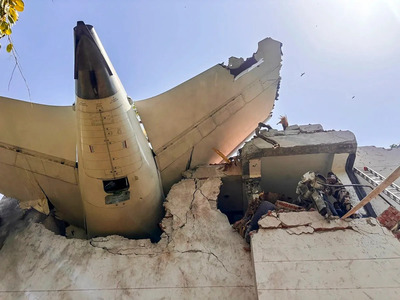Progress in Gaza Ceasefire Talks Amid Divergent Perspectives
Recent developments signal potential advancements in negotiations between Hamas and Israeli officials, buoyed by Qatari mediation.
Negotiations regarding a ceasefire in Gaza are gaining momentum following a period of stagnation, with official Qatari sources indicating ongoing discussions and Israeli commentary suggesting a possibility for progress towards an agreement.
The proposal from U.S. Middle East envoy Steve Witkoff, which had previously received preliminary approval from Hamas, aims for a 60-day truce and the exchange of hostages.
It includes provisions for the release of 28 of the 56 captives held in Gaza in exchange for over 1,200 Palestinian prisoners and the facilitation of humanitarian aid into the region.
Israeli sources have reported that Qatar is awaiting an updated response from Hamas regarding Witkoff's proposal, emphasizing the potential for advancing the negotiations aimed at securing a ceasefire.
A statement from Qatar’s International Media Office highlighted the 'critical phase' of mediation efforts currently underway, suggesting that tangible progress may be on the horizon.
The second ceasefire in March collapsed after two months, and recent direct negotiations between Hamas and U.S. officials in Doha have yielded limited breakthroughs.
Complicating the scenario is the U.S. veto last week on a United Nations Security Council resolution calling for an immediate and unconditional ceasefire in Gaza.
Hamas issued a statement on Sunday, asserting that its resistance initiatives are a reactive measure to what it described as systematic civilian extermination and reiterated that a comprehensive peace deal is the only viable solution.
Internally, Israeli political dynamics are shifting, as the Shas party plans to vote for the dissolution of the Knesset, expressing dissatisfaction with Prime Minister Benjamin Netanyahu concerning the handling of military service exemptions for Haredi citizens.
Dr. Tarek Fahmy, a political science professor specializing in Israeli-Palestinian relations, anticipates a positive response from Hamas to Witkoff's proposal, although he notes that Netanyahu may delay responding due to the Knesset dissolution discussions and concerns from Shin Bet over the timing of the ceasefire.
Conversely, Palestinian political analyst Ibrahim al-Madhoun has expressed skepticism about any imminent progress in talks, highlighting that the media focus on negotiations may distract from ongoing violence against civilians.
Recent communications indicate that there may be slight advancements in persuading Hamas to soften its stance on the U.S. proposal, potentially driven by increasing pressure from Qatari intermediaries.
Reports suggest that if Hamas responds favorably, Witkoff may travel to the region within days.
Fahmy noted that the onus of decision-making now rests with Israel, as it has exercised considerable military action and territorial control in Gaza.
Both Egypt and Qatar have shown willingness to act as guarantors for any forthcoming agreement.
In a related statement, U.S. President Donald Trump alluded to significant negotiations concerning Gaza involving various parties, including Iran, although Israeli officials have denied such claims.
Witkoff has publicly affirmed his commitment to achieving a resolution, focusing primarily on the release of hostages despite Hamas's firm resistance.
Analysts, including al-Madhoun, assert that Witkoff’s statements signal a prioritization of Israeli objectives over addressing humanitarian concerns, suggesting a pattern of dual standards in how Israeli and Palestinian lives are perceived in the continuation of hostilities.
Despite the rhetoric surrounding negotiations, a sense of urgency and complexity remains regarding the potential for an effective peace framework.
The proposal from U.S. Middle East envoy Steve Witkoff, which had previously received preliminary approval from Hamas, aims for a 60-day truce and the exchange of hostages.
It includes provisions for the release of 28 of the 56 captives held in Gaza in exchange for over 1,200 Palestinian prisoners and the facilitation of humanitarian aid into the region.
Israeli sources have reported that Qatar is awaiting an updated response from Hamas regarding Witkoff's proposal, emphasizing the potential for advancing the negotiations aimed at securing a ceasefire.
A statement from Qatar’s International Media Office highlighted the 'critical phase' of mediation efforts currently underway, suggesting that tangible progress may be on the horizon.
The second ceasefire in March collapsed after two months, and recent direct negotiations between Hamas and U.S. officials in Doha have yielded limited breakthroughs.
Complicating the scenario is the U.S. veto last week on a United Nations Security Council resolution calling for an immediate and unconditional ceasefire in Gaza.
Hamas issued a statement on Sunday, asserting that its resistance initiatives are a reactive measure to what it described as systematic civilian extermination and reiterated that a comprehensive peace deal is the only viable solution.
Internally, Israeli political dynamics are shifting, as the Shas party plans to vote for the dissolution of the Knesset, expressing dissatisfaction with Prime Minister Benjamin Netanyahu concerning the handling of military service exemptions for Haredi citizens.
Dr. Tarek Fahmy, a political science professor specializing in Israeli-Palestinian relations, anticipates a positive response from Hamas to Witkoff's proposal, although he notes that Netanyahu may delay responding due to the Knesset dissolution discussions and concerns from Shin Bet over the timing of the ceasefire.
Conversely, Palestinian political analyst Ibrahim al-Madhoun has expressed skepticism about any imminent progress in talks, highlighting that the media focus on negotiations may distract from ongoing violence against civilians.
Recent communications indicate that there may be slight advancements in persuading Hamas to soften its stance on the U.S. proposal, potentially driven by increasing pressure from Qatari intermediaries.
Reports suggest that if Hamas responds favorably, Witkoff may travel to the region within days.
Fahmy noted that the onus of decision-making now rests with Israel, as it has exercised considerable military action and territorial control in Gaza.
Both Egypt and Qatar have shown willingness to act as guarantors for any forthcoming agreement.
In a related statement, U.S. President Donald Trump alluded to significant negotiations concerning Gaza involving various parties, including Iran, although Israeli officials have denied such claims.
Witkoff has publicly affirmed his commitment to achieving a resolution, focusing primarily on the release of hostages despite Hamas's firm resistance.
Analysts, including al-Madhoun, assert that Witkoff’s statements signal a prioritization of Israeli objectives over addressing humanitarian concerns, suggesting a pattern of dual standards in how Israeli and Palestinian lives are perceived in the continuation of hostilities.
Despite the rhetoric surrounding negotiations, a sense of urgency and complexity remains regarding the potential for an effective peace framework.








